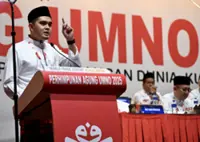Mangione is taken into the Blair County Courthouse on on Dec 10, 2024, in Hollidaysburg, Pa. Within hours of his arrest on Dec 9, many of his social media accounts had been scrubbed and were no longer accessible to the public. Others remained active. — Pittsburgh Post-Gazette via AP
Moments after authorities announced that Luigi Mangione had been arrested in the killing of UnitedHealthcare’s CEO on Dec 9, people delved into his digital trail.
Strangers commented on what appeared to be Mangione’s old Instagram photos from Hawaii and read his reviews of the Hunger Games series on Goodreads. Within hours, many of his social media accounts had been scrubbed and were no longer accessible to the public. Others remained active.
Here’s how different social media companies decide whether to scrub a user’s digital footprint.
A digital footprint can suddenly reach a wide audience.
When someone goes from having a private life to getting public attention, online accounts they intended for a small circle of friends or acquaintances are scrutinized by curious strangers – and journalists.
In some cases, these newly public figures or their loved ones can shut down the accounts or make them private. Others, like Mangione, who has been charged with murder, are cut off from their devices, leaving their digital lives open for the public’s consumption.
Either way, tech companies have discretion in what happens to an account and its content.
Section 230 of the Communications Decency Act protects companies from legal liability for posts made by users. “Companies generally have a lot of freedom to decide what content to allow and what content to remove,” said Jolynn Dellinger, a senior lecturing fellow at Duke University School of Law.
Facebook and Instagram remove ‘dangerous’ individuals.
Meta, the parent company of Facebook, Instagram and WhatsApp, has a “dangerous organisations and individuals” policy that prohibits organisations and individuals from using its platforms if they “proclaim a violent mission or are engaged in violence”. That determination is made on the basis of a user’s online and offline behavior, the policy says.
That policy seems to have been applied to Mangione, whose Facebook and Instagram accounts were no longer accessible shortly after he was detained.
On X, the suspect’s account now has a blue check mark.
It was not clear whether X has a policy for a scenario like this; the company did not respond to requests for comment.
At first, X suspended Mangione’s account Monday, then it reinstated it.
Mangione’s X account was still online as of Wednesday afternoon and had more than 400,000 followers.
After someone posted a message on X about Mangione’s account being suspended, Elon Musk, X’s owner, responded: “This happened without my knowledge. Looking into it.”
The account was back up less than an hour later, and by Wednesday, it had a blue check mark, which indicates it has access to X Premium, a subscription service.
LinkedIn focuses on policy violations.
LinkedIn restricts accounts if they violate a number of policies. Mangione’s account does not appear to violate any of the policies, and his account is still online.
“Our policies are clear about what’s allowed on platform, and we enforce them consistently for everyone,” the company said in a statement.
Reddit suspends suspects in high-profile crimes.
On Reddit, Mangione wrote about his health struggles, including back pain and brain fog. His account there has been suspended.
A Reddit spokesperson said its policy is to suspend accounts that may be related to suspects in high-profile criminal investigations.
His Goodreads was made private, then public, then private again.
Goodreads, where people keep track of their reading habits and review books, does not appear to have a clear policy on how offline behaviour could affect an account’s status.
Mangione’s account was restricted Tuesday, but available again to the public Wednesday, before being made private again. The account includes reviews for books including The Lorax and Industrial Society And Its Future, better known as the Unabomber manifesto, by Ted Kaczynski.
It appeared as if someone, or many people, gained access to Mangione’s account Wednesday because new book reviews were posted that day, while he was in police custody.
Goodreads did not respond to requests for comment.
On TikTok, it varies.
It is not clear whether Mangione had a TikTok presence. TikTok can ban accounts, but its policies don’t make clear how offline behaviour may affect that. There are numerous possible user violations, such as posting inappropriate or illegal content, that could get someone banned. TikTok did not respond to requests for comment. – ©2024 The New York Times Company





